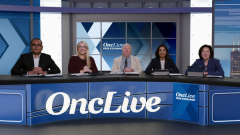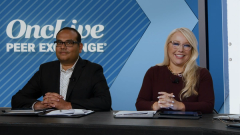
HR+/HER2- BC: Selecting a CDK4/6 Inhibitor in the Frontline Setting
Taking into account all 3 available CDK4/6 inhibitors in HR+/HER2- breast cancer, experts consider how they’d select frontline therapy in this setting.
Episodes in this series

Transcript:
Hope S. Rugo, MD, FASCO: Mark and Komal, will this data change your use of CDK4/6 [cyclin-dependent kinases 4 and 6] inhibitors? How are you going to apply this to your clinic?
Mark Pegram, MD: I like to look at this data from 2 different vantage points. One is clinical; from a clinical perspective, we now have level 1 evidence from a randomized, controlled phase 3 trial of an overall survival benefit that's statistically significant in the case of the first-line ribociclib plus AI [aromatase inhibitor] data. That is the gold standard for clinical decision-making: level 1 evidence, phase 3 trial, statistically significant OS [overall survival]. For clinical decisions, that's impactful to me. With the evidence we have available right now, that one is the surest bet and has the most robust OS data. The other perspective I like to look at this data set from is more from a scientific point of view. From that point of view, things are a little bit less clear. If you say that the null hypothesis is that palbociclib has no OS benefit in the first line, then looking at those curves and some of the relevant subsets like the planned analysis of PALOMA-1 plus PALOMA-2 data and the subset that has a longer disease-free interval, et cetera, when you look at the data from that lens and say, well, the null hypothesis is there's no impact on survival, no statistician would say that that's probably right. It doesn't rise to the level of statistical significance, to be sure, but that does not mean that there might not be an interaction, we just failed to demonstrate it in this trial—and there are so many variables as you rightly pointed out: geographic location of the patient populations in all the first-line studies that affects later-line therapy in ER [estrogen receptor]-positive disease. Different countries have different standards of care, and that could impact outcome. The crossover rates may differ from trial to trial. There are subtle differences between the patient populations, demographics, and pathology, etcetera, as well, so these things are not always clear. Finally, none of the trials had a 100% statistical power to detect an OS benefit if 1 truly exists. I think the data from Dr Richard S. Finn, University of California Los Angeles, in this presentation at this 2022 ASCO [American Society of Clinical Oncology] annual meeting, said the power for OS is about 80% in PALOMA-2 in the intensely treated population, so 1 out of 5 times you run that trial, you will probably fail to see an OS benefit statistically due to play of chance. That's also a possibility that we can't overlook from the scientific perspective, but the clinical data are in, and right now, I think ribociclib carries it there.
Hope S. Rugo, MD, FASCO: It's an interesting question. One of the questions for you is, how does this affect your use of CDK4/6 inhibitors? How do you balance the adverse events from the different agents? We'll talk more about quality of life in a moment, but how do you balance that when you're making decisions?
Komal Jhaveri, MD, FACP: It is very important, and Mark pointed all the right things about how clinical decisions and how level 1 data are available. When we look at these trials, all of these trials, as we said, were powered for the primary end point of progression-free survival. If you look at those curves, they are nearly identical with identical hazard ratios. It's very frustrating in some ways to then go back and say, “OK, but now we're not seeing overall survival benefit in one study but we're seeing that in other; are there significant differences that can explain the difference between the 2 agents?” Certainly we do realize there are structural differences. There are differences in their CDK4 and -6 inhibition profiles and their toxicity profiles, but it's not very clear if that can translate into a significant clinical impact in terms of the difference in numbers and overall survival. Having said that, for me, it's going to have a patient in front of me, discuss the toxicity profiles as well, look at their comorbid conditions, see what kind of comorbidities that they have, what kind of medications they're already taking concomitantly; would that come in the way in terms of toxicity? For example, sometimes some patients are taking antidepressants, and that can have QTC prolongations. Would that come in the way of utilizing ribociclib? Or with dose reduction, would that not be an issue? Inflammatory bowel disease—that comes in the way for abemaciclib, so we must keep all of that in mind. Ultimately, quality of life, a good balance from tolerability, toxicity—quality of life for a patient and the efficacy data as we have—we can have a discussion with our patient.
Hope S. Rugo, MD, FASCO: That is all really important. Aditya, would this data make you change somebody? Are you going to go back to work after ASCO and change a patient's CDK4/6 inhibitor?
Aditya Bardia, MD, MPH: It's interesting whether PALOMA-2 is a practice-changing study from other perspectives in the sense that we should not use palbociclib. In patients who are currently on palbociclib, I would feel very comfortable continuing them on it. If there's a new patient with metastatic disease, be it de novo metastatic disease or someone who recurs after adjuvant endocrine therapy, the choice of CDK4/6 inhibitors, as Komal was discussing, whether premenopausal, postmenopausal, the comorbid conditions—it does increase the enthusiasm for ribociclib because you have overall survival data which is with level 1 evidence.
Hope S. Rugo, MD, FASCO: A general question about how you treat younger women who have advanced breast cancer: do you always use ovarian function suppression in the first-line setting?
Aditya Bardia, MD, MPH: In the first line, yes. I tend to use ovarian suppression plus an endocrine therapy like AI plus a CDK4/6 inhibitor. For someone who's premenopausal, my choice is ribociclib, given that we have level 1 evidence from MONALEESA-7.
Hope S. Rugo, MD, FASCO: Anne, what do you think about that?
Anne O'Dea, MD: I agree. I tend to approach the premenopausal patients the same way. I think it's interesting that we're all debating this right now and just as we do this, the landscape is going to change. We have adjuvant CDK4/6 and who knows what that impact is going to be on overall survival with first-line CDK4/6 when the new metastatic breast cancer patient might have very well been exposed to 2 years of adjuvant CDK4/6. Just as soon as we continue to digest all this information and process it, things will be changing.
Hope S. Rugo, MD, FASCO: How does the data and the discussions at ASCO 2022 this year change the way you're going to start the next patient on a CDK4/6 inhibitor?
Anne O'Dea, MD: I think for me it's probably not going to be different. I agree with Dr Bardia about the premenopausal patients. That's been my practice pattern based on MONALEESA-7. I have had such great luck with palbociclib. I have patients that feel so well on it and have continued to do well for so long and I have many patients that travel to see us from a great distance. I practice in a rural state, so less monitoring is helpful as well.
Hope S. Rugo, MD, FASCO: That's interesting.
Transcript edited for clarity.








































